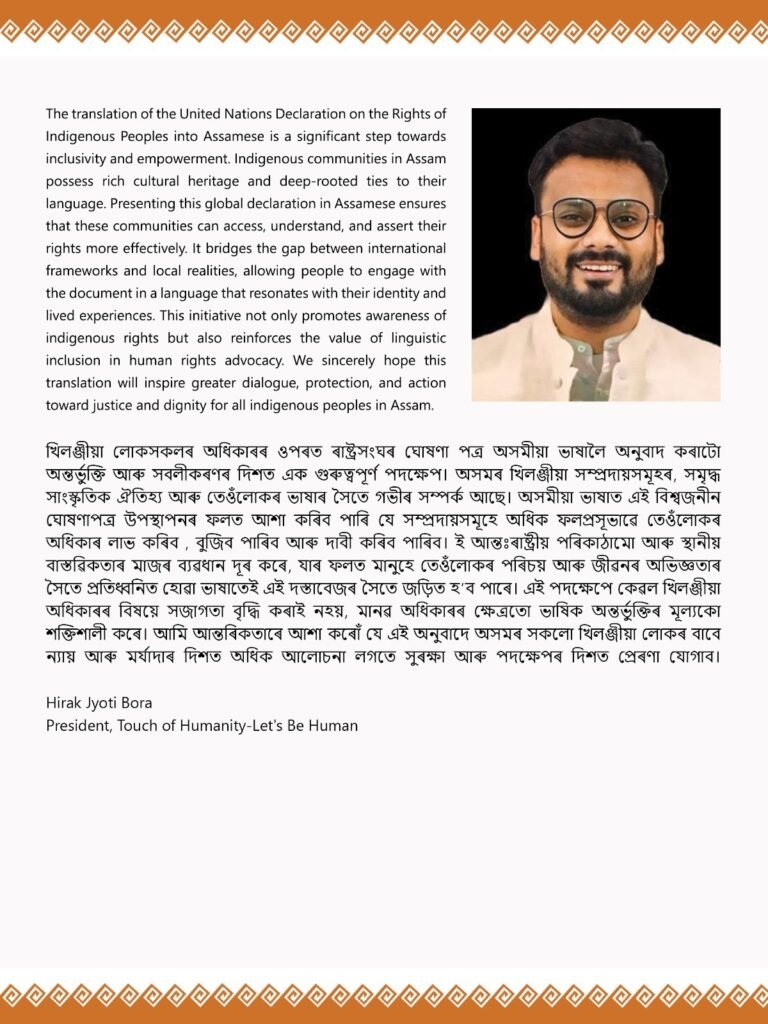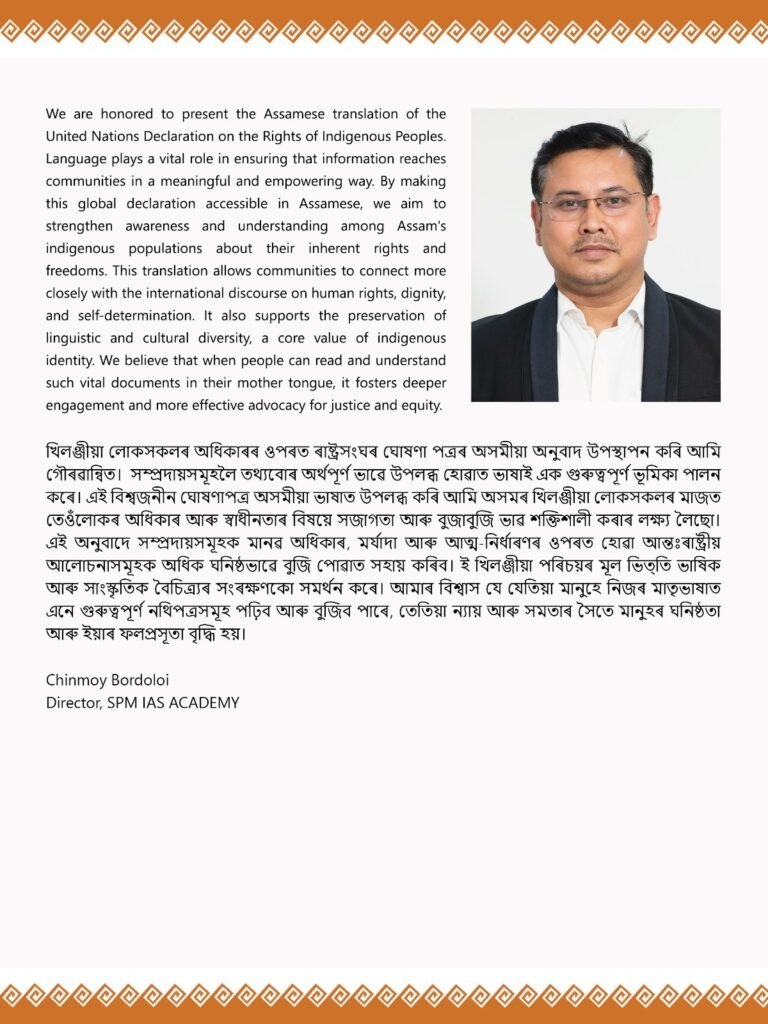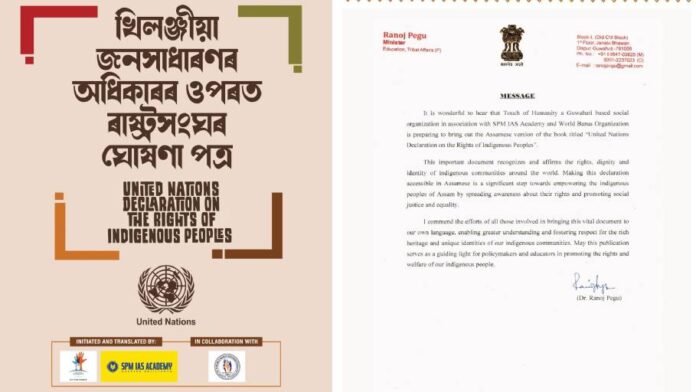In a historic milestone for linguistic inclusion and indigenous representation, the first-ever Assamese translation of the United Nations Declaration on the Rights of Indigenous Peoples (UNDRIP) was formally launched at the 18th Session of the Expert Mechanism on the Rights of Indigenous Peoples held at the Palais des Nations in Geneva, Switzerland. The Assamese version of this globally significant document was ceremonially handed over to Mr. Guilherme Canela, Director of the Division for Inclusion, Digital Policies and Digital Transformation.

Assamese Translation of UN Indigenous Rights Declaration Launched
The initiative marks a pioneering effort in bringing global human rights frameworks closer to indigenous populations through their own languages. It is the first time that the UNDRIP has been officially translated into Assamese—a language spoken by millions in Northeast India and deeply embedded in the cultural fabric of the region.

The translation project was the outcome of months of dedicated work and coordination led by Chinmoy Bordoloi, Director of SPM IAS Academy, Guwahati. His leadership in managing the complex process of translation, verification, and alignment with UN terminology standards was central to the success of the initiative. The project was conceptualized and initiated by Hirak Jyoti Bora, Founder and President of the NGO Touch of Humanity – Let’s Be Human, which is registered under the Societies Act XXI of 1860. The effort also received international backing and logistical support from the World Barua Organisation, a Geneva-based entity with ECOSOC consultative status with the United Nations since 2012.

Speaking about the significance of the event, Mr. Hirak Jyoti Bora remarked, “This translation is not just about making a document accessible in a new language. It’s about giving voice to the indigenous peoples of Assam and empowering them with knowledge of their rights. We hope this initiative will inspire many more indigenous language translations of international human rights instruments.”

The Assamese translation of UNDRIP will serve as a valuable resource for academics, policymakers, educators, and indigenous communities across Assam. It also opens doors for deeper engagement with global discourses on indigenous rights and ensures that communities in Assam can better understand and advocate for the protections guaranteed to them under international law.
On the occasion, Assam’s Honourable Minister of Education, Dr. Ranoj Pegu, extended his heartfelt congratulations to the team and highlighted the importance of such efforts. In a special message, Dr. Pegu said:
“This important document recognizes and affirms the rights, dignity, and identity of indigenous communities around the world. Making this declaration accessible in Assamese is a significant step towards empowering the indigenous peoples of Assam by spreading awareness about their rights and promoting social justice and equality.”
Dr. Pegu further acknowledged the dedication and commitment of all individuals involved in the translation process, adding that such initiatives strengthen the identity, pride, and socio-political consciousness of indigenous populations. He noted that localizing global human rights declarations not only fosters inclusivity but also enables better policy-making and educational outreach at the grassroots level.
UNDRIP, which was adopted by the United Nations General Assembly in 2007, is a landmark declaration that sets out the individual and collective rights of indigenous peoples, including their rights to culture, identity, language, employment, health, and education. It emphasizes their rights to maintain and strengthen their own institutions, cultures, and traditions, and to pursue their development in keeping with their own needs and aspirations.
The Assamese translation will help demystify this crucial international document for Assamese-speaking communities, many of whom belong to various indigenous groups such as the Bodo, Mishing, Karbi, and others. It is expected to be distributed through academic institutions, NGOs, and government departments in Assam and the Northeast.
Chinmoy Bordoloi of SPM IAS Academy emphasized the larger vision behind this initiative: “Our goal is to democratize knowledge. The UNDRIP in Assamese is a powerful tool for educating the masses about their rights and responsibilities. We hope this will encourage informed discourse and inspire young minds to take an interest in governance, law, and justice.”
He also added that this translation represents just the beginning. Plans are underway to translate UNDRIP into other indigenous languages of the Northeast and to organize awareness drives in collaboration with civil society organizations and educational institutions.
The formal handover of the document in Geneva has attracted attention from human rights organizations, language preservation advocates, and policymakers across the globe. The event symbolizes how localized efforts can contribute meaningfully to global goals—especially those concerning inclusion, diversity, and empowerment.
For Assam, the launch of this Assamese version of the UN Declaration on the Rights of Indigenous Peoples is not just a matter of translation—it is a statement of cultural pride, a tool for empowerment, and a call for greater respect for the region’s diverse ethnic heritage. It marks Assam’s growing presence in global platforms and its commitment to upholding the rights and dignity of its indigenous communities.
The translation initiative is now being seen as a benchmark for similar efforts across other Indian states and indigenous regions of the world. As the conversation on indigenous rights gains momentum globally, Assam has made its voice heard—loud, clear, and in its own language.












